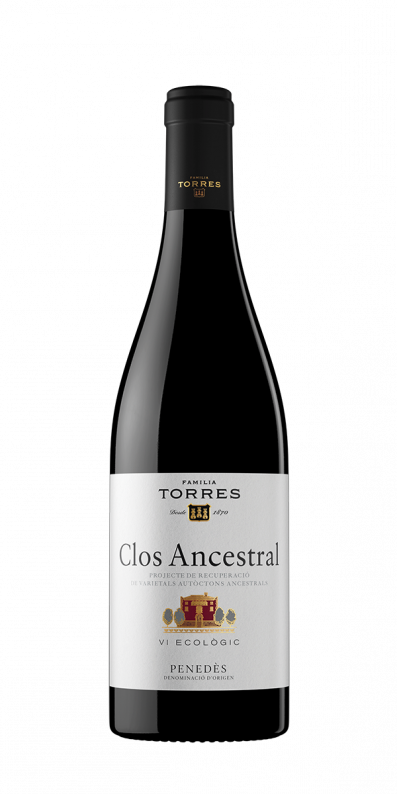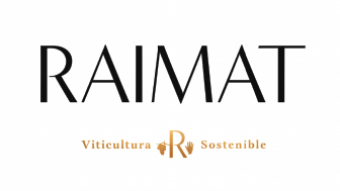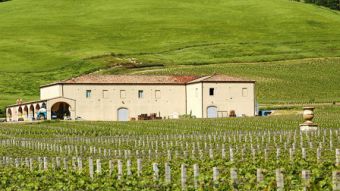The recovered variety Moneu joins the blend of Familia Torres’s new wine Clos Ancestral 2019.
This organic Penedès red wine originates from Castell de la Bleda, an enclave with 2,500 years of vinicultural history. Moneu, one of the pre-phylloxera varieties that Familia Torres has recovered, shows great potential in terms of winemaking and adapting to climate change.
takes another step forward in its project to recover ancestral varieties with a new organic wine from Penedès whose blend features the little known Moneu grape. Clos Ancestral 2019 is a wholly original wine, the only one to include this variety, which the 150-year-old family winery rescued from oblivion. After studying the variety exhaustively, Familia Torres planted Moneu at the historical Castell de la Bleda estate in Santa Margarida i Els Monjos.
Moneu is indigenous to Penedès, and Familia Torres rediscovered the variety 20 years ago near the town of Querol. The winery reintroduced Moneu to the region in 2016 on an experimental basis by top-grafting the variety on to free-standing vines that were up to 40 years old. The variety ripens slowly and can withstand the high temperatures and drought conditions caused by climate change. It maintains moderate alcohol levels and remarkable acidity despite being one of the last varieties harvested in Penedès.
 Clos Ancestral 2019 is made from three organically grown indigenous varieties: 40-year-old vines of Ull de Llebre (Tempranillo), Garnacha, and Moneu. Both the ancestral Moneu and Tempranillo grapes are grown at Castell de la Bleda, whereas the Garnacha is sourced from a nearby vineyard. Each variety is vinified and aged separately. The Moneu variety involves a meticulous process, both in the vineyard and the winery, which includes partial ageing in earthenware jars and amphorae.
Clos Ancestral 2019 is made from three organically grown indigenous varieties: 40-year-old vines of Ull de Llebre (Tempranillo), Garnacha, and Moneu. Both the ancestral Moneu and Tempranillo grapes are grown at Castell de la Bleda, whereas the Garnacha is sourced from a nearby vineyard. Each variety is vinified and aged separately. The Moneu variety involves a meticulous process, both in the vineyard and the winery, which includes partial ageing in earthenware jars and amphorae.
The result is a seductive, fresh, and aromatic wine that displays good concentration, complexity, and balance. Its delicacy makes for an unusually distinctive wine of great personality. The 2019 vintage was a dry year with generally normal temperatures, except for the summer, especially late June, when they were above average.
According to Miquel Torres Maczassek, fifth generation Familia Torres, “After spending so many years on the recovery of these varieties, studying them, gradually getting to know them, it is all the more exciting to present them to the wider world. As a first step, we included the Moneu variety in the blend of our new Clos Ancestral, and we are certain that this will help reinforce the identity of Penedès reds. We intend to increase the percentage of Moneu as new plantings are consolidated, but at the same time, we don't want to make a 100% varietal wine, because we're interested in preserving the historical diversity of the vineyard.” He goes on to say, “The Clos Ancestral wine is inextricably linked to this particular Penedès enclave, the Castell de la Bleda estate; it tells us about the history of the place, and the winemaking traditions and heritage of Penedès.”
Familia Torres began searching for ancestral varieties in the early 1980s as a way of helping to restore the winemaking heritage of Catalonia. Over the past decade, the fifth generation has brought new momentum to the project in response to climate change after observing that some of the more than 50 recovered varieties not only display great enological potential, but have a high capacity to adapt to the new climate scenario.
A tribute to the age-old vinicultural history of Penedès
As winegrowers with Penedès roots that date back to the 16th century, Familia Torres conceived Clos Ancestral as a tribute to the vinicultural history of the region. Not only does the wine feature a pre-phylloxera variety, but it hails from an estate dedicated to winegrowing for 2,500 years as evidenced by archaeological finds at Castell de la Bleda.
In 2018, archaeologist Xavier Esteve conducted a survey of the interior of the manor house, which revealed the presence of an Iberian settlement between the 5th and 3rd centuries BC, a Roman villa, and a medieval castle and farmhouse. The existing building dates from the 17th century and is listed as a Cultural Asset of National Interest (BCIN).
Located near the flagship Mas La Plana vineyard, the Castell de la Bleda estate has 16 hectares under vine, planted in deep loam soils. The vineyard is largely dedicated to the study of the Moneu variety. It is divided into various parcels where the viticultural team experiments with different training systems and planting densities.
Moneu and the white Forcada grape are two of the ancestral varieties that Familia Torres has planted most extensively in Penedès after receiving the approval of the Regulatory Council in 2018. As for the other recovered varieties with great winemaking potential: Querol and Garró are planted in DO Conca de Barberà, and Pirene and Gonfaus in DO Costers del Segre – the former at the Sant Miquel de Tremp vineyard in the foothills of the Pyrenees, and the latter at the Purgatori vineyard in Les Garrigues. The flagship Grans Muralles wine was the first to exemplify the recovery of ancestral varieties in the late 1990s, followed by Forcada, first released in 2019 and aimed at high-end restaurants.





